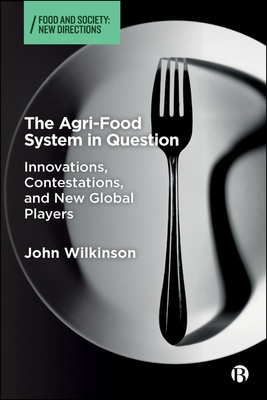Hosted byÌýAUR's Master in Food Studies
Chair:ÌýMaria Grazia Quieti
Presenter:ÌýProf. John Wilkinson
Discussant:ÌýDr Kostas Stamoulis
 To mitigate climate, biodiversity, and public health crises, the global agrifood system needs radical change.ÌýÌýWhile the Global North remains central to agrifood innovation,ÌýÌýnew players in the South, especially Brazil and China, will increasingly determine its pace and direction.
To mitigate climate, biodiversity, and public health crises, the global agrifood system needs radical change.ÌýÌýWhile the Global North remains central to agrifood innovation,ÌýÌýnew players in the South, especially Brazil and China, will increasingly determine its pace and direction.
Prof. John Wilkinson will present his new book and discuss with Dr Kostas Stamoulis how a new generation of actors, not associated with traditional agrifood interests,ÌýÌýare exploring radical options to address the widely acknowledged crisis of the global food systemÌý whether viewed from a health,ÌýÌýenvironment, climate, or animal welfare perspective. Such options have become possible through the convergence of advances inÌýÌýgenetics, big data digitalization, and artificial intelligence.ÌýOn the other hand, since the `80s, social movements, have shown themselvesÌýÌýcapable of developing an alternative food agenda and also of stopping in their tracks unwanted technological innovations. To add to theseÌýÌýuncertainties, global food markets and investments have shifted from North/South to South/East, with China as the pivot of current agrifood restructuring. Economic growth and urbanization is being dominated by states with ample capital but inadequate natural resources to ensure food security and therefore more open to promoting the radical innovations related to climate controlled agriculture and alternative proteins. At the same time, traditionalÌý Ìý animal protein interests are creating regulatory and legislative barriers to these new food options. The author skillfullyÌý Ìýexplores the way theseÌý heterogeneous forces are interacting and, while recognizing that earlier expectations have been dampened, argues that the current innovation wave is showing itself to be too diverse and broad based for simple cooptation by the established global players in agrifood.
Ìý
 John Wilkinson,Ìý (Ph.D. in Sociology, University of Liverpool), Ìýis Full Professor atÌýthe Rural Federal University of Rio de Janeiro, Brazil. His research focuses on the major transformations in the global agrifood system and their impact forÌýsmall farming and rural development. He has been a consultant to the OECD, FAO, BID, CEPAL, and the European Commission, together with Ministries and Financial Institutions in Brazil and the Southern Cone, and has also carried out research for international NGOs, OXFAM and ACTIONAID among others.
John Wilkinson,Ìý (Ph.D. in Sociology, University of Liverpool), Ìýis Full Professor atÌýthe Rural Federal University of Rio de Janeiro, Brazil. His research focuses on the major transformations in the global agrifood system and their impact forÌýsmall farming and rural development. He has been a consultant to the OECD, FAO, BID, CEPAL, and the European Commission, together with Ministries and Financial Institutions in Brazil and the Southern Cone, and has also carried out research for international NGOs, OXFAM and ACTIONAID among others.
ÌýHis latest bookÌýÌýÌýhas just been published by Bristol University Press.ÌýHe is the (co)author of several books,ÌýFrom Farming to Biotechnology;ÌýFair Trade: the challenges of transforming globalization; andÌýO Sabor da OrigemÌý(The Taste of Origin), and has published many articles in internationally recognized Journals. He has spent periods as an invited researcher to the National Institute for Agricultural Research (INRA) inÌý Paris, to the University of Santa Cruz, California, and to the European Commission. He was the coordinator of the FAO/CFS Report,ÌýBiofuels and Food SecurityÌýin 2013. WilkinsonÌýhas published over 150 books, chapters, and articles in English, Portuguese, Spanish, and French. In 2019, he was listed among the top 2% of researchers atÌýAcademia.edu.ÌýHe hasÌý.
Ìý
 Kostas ( Konstantinos) GeorgeÌýStamoulis (Ph.D. in Agricultural and Resource Economics,ÌýÌýUniversity of California at Berkeley, USA), former Assistant Director-General of the Economic and Social Department of FAO,ÌýÌýisÌýcurrently an independent consultant on issues related to economic social and policy analysis of sustainable food systems.Ìý
Kostas ( Konstantinos) GeorgeÌýStamoulis (Ph.D. in Agricultural and Resource Economics,ÌýÌýUniversity of California at Berkeley, USA), former Assistant Director-General of the Economic and Social Department of FAO,ÌýÌýisÌýcurrently an independent consultant on issues related to economic social and policy analysis of sustainable food systems.Ìý
Dr Stamoulis held a number of positions for 30 years in FAO in technical, managerial and strategy development.ÌýÌýÌýHe wasÌýStrategic Programme Leader for the Food Security and NutritionÌýStrategicÌýProgrammewhich cut across several disciplines and geographical regions,ÌýDirector of the Agricultural Development Economics Division,ÌýSecretary of the Committee on World Food Security (CFS)Ìýwhere he played a key role in the reform of the committee.Ìý
HeÌýÌýhas experience in the analysis and policy aspects covering a wide array of issues: food security, agricultural and rural development, food systems transformation, rural-urban linkages, urban food systems and environmental economics. He has been the author of numerous publications ( books, monographs and many articles in peer-reviewed professionalÌýÌýjournals).ÌýÌýFor many years he had the overall supervision and guidance for the major FAO flagship publications :ÌýThe State of Food and Nutrition in the World ( SOFI), the State of Food and Agriculture (SOFA)ÌýandÌýFAO’s Global Perspectives work.ÌýÌý
Before joining FAO in 1989, he was Assistant Professor of Agricultural Economics at the University of Illinois in Urbana Champaign ( USA).
Register your attendance at forthcoming AUR events
